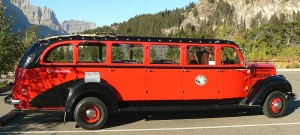 Can it be that Americans prefer to enjoy the outdoors from the climate-controlled womb of their cars? That’s one way to read recent stats from the National Park Service, as relayed by USA Today.
Can it be that Americans prefer to enjoy the outdoors from the climate-controlled womb of their cars? That’s one way to read recent stats from the National Park Service, as relayed by USA Today.
Overall, visits to the parks are up, but the time spent in each park is down by about 15 percent. In other words, people like to stop in, look around fast and leave. Like an snoopy neighbor with a social anxiety disorder.
Park officials aren’t sure why people don’t stay longer. Maybe they really don’t want to leave their vehicles, for fear of bears. But it seems obvious that some of the downturn can be explained by demographics. The visitor population is aging as it expands; more old people are visiting, and they are less likely to lace up their boots for a four-day trek into the backcountry. Fewer campers equals less time in the park. (But more business for local motels and restaurants.)
That interpretation syncs up with other statistics from the outdoor industry, which indicate that people are putting more time and money into the outdoors. “Over the past five years, spending on outdoor recreation has increased by 5 percent annually.” That is, the country’s graying population enjoys the outdoors. They spend money on apparel and vacation travel to get out of the city and close to the wild. They just don’t want to sleep on the hard ground.
The drop-off in camping has been so steep, though, that one wonders if something else could be going on. From the peak in 1994, camping nights in the park system have dropped by 25 percent.
Interpretations notwithstanding, traffic is on the upswing as more people sweep into the park, tick a few signature sites off the bucket list and move on. During the busiest midday hours, parking and services are strained. To avoid the crush, “rangers advise visitors to either arrive early or show up late in the day, to use public buses and to follow other tips to improve the traffic flow.”
Photo: Jammer bus at the St. Mary Lake Visitor Center, Glacier National Park, by Ken Thomas, via Wikimedia Commons.









